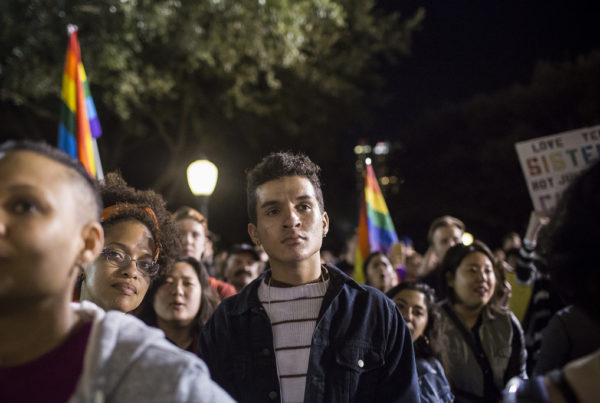The Washington Post reports that this week’s midterms were the “election of the caravan. But no one bothered to tell the caravan: thousands of migrants awoke in Mexico City on Wednesday and resumed their northward trek. Now, President Donald Trump has issued an executive order aimed at stopping migrants from declaring asylum if they try to enter illegally.
Fatma Marouf is professor of law, and director of the Immigrant Rights Clinic at the Texas A&M University School of Law. Marouf says Trump’s order conflicts with the law.
“It seems to contravene our current immigration laws, which allow people to apply for asylum regardless of how they enter the country,” Marouf says.
She says Trump has a “special emergency power” to suspend the entry of people whom he believes pose a threat to the country, but she says it might be hard to prove that in this case. But Marouf says the fact that his order covers a large group of people as opposed to just focusing on individuals who are deemed a threat might not matter.
“This is the same power he used in the travel ban, which declared entire countries to be detrimental to the United States,” Marouf says.”That broad, sweeping use of power was upheld by the Supreme Court in that case, which suggests that the court might, again, be very deferential here.”
But Trump’s order only applies to people who try to seek asylum after entering the U.S. illegally; Marouf says it doesn’t apply to those who enter the country legally.
“This rule has no impact on people who enter at a port of entry,” Marouf says.
But she says some asylum-seekers don’t get the chance to apply for asylum because they have a hard time getting into the country when they try to do it legally.
“A lot of people have tried to enter at port of entries but … they’ve been turned back by some of the border agents at the ports, told that the U.S. doesn’t even offer asylum anymore, that the ports are full. And so we’ve had problems of people just sleeping on the bridges, trying to get in, trying to apply, and if they can’t, going around to try to enter between ports of entry,” Marouf says.
Marouf says the current law puts asylum-seekers who enter the U.S. illegally through an expedited process – they, first, have to pass a “credible-fear interview,” and then would have a full asylum hearing if they clear that first step. With the executive order, an asylum-seeker in that situation wouldn’t be able to apply for asylum, but could still apply for other types of relief that Marouf says are harder to get.
“So, I’m not sure this would really speed up deportations in the way the president thinks it would,” Marouf says.
The president’s executive order is meant, in theory, to deal with a temporary, emergency situation, but it’s unclear how long it will actually last or if would change immigration and asylum law long term. Marouf says if the order lasts indefinitely, that could be a legal problem, but the Trump administration found a way around that during the travel ban lawsuit in 2017.
“The travel ban was also indefinite in nature, and the Supreme Court said, ‘Well, once countries fix their vetting procedure to comply with our standards, it’ll be lifted.’ That’s what the government urged the court to do,” Marouf says. “In this case, it’s kind of similar, where we don’t know, right now, how long it’ll last, but that still might be upheld by the courts given the precedent set by the travel ban.”
Marouf says it’s also not clear that there is an actual emergency or that the migrant caravan is a threat to national security.
“I don’t think there is a clear emergency that’s been defined,” Marouf says. “He’s tried to portray the caravan as violent and dangerous, but there’s really not evidence showing that asylum-seekers coming from Central America are posing a danger to our country in any way. Most of them are just fleeing for their lives.”
It’s likely that Trump’s executive order will face legal challenges, and Marouf says it will be an “uphill battle” for President Trump.
“He’s going to have to show that this was an authorized use of his power under the Immigration Act,” Marouf says. “He’s gonna have to give at least some reasons explaining why there is a national security threat here.”
Written by Caroline Covington.
















